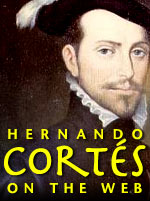
About Cortes
The sections Cortés biographies and The Conquest of Mexico separate pages according to their dominant focus. If a site covered his early life and later discoveries in California it was considered "biography," but Cortés and his conquests are too deeply interwoven for such division to mean much.
Cortés biographies | The Conquest of Mexico | Pocket bios | More about Cortés
Cortés biographies
11th Edition Encyclopedia Britannica (1911): Hernan Cortés. Detailed, stirring and sympathetic entry crediting the conquest of Mexico entirely to Cortés' "genius, valour and profound but unscrupulous policy." Readers unfamiliar with the major details are warned against relying on the text too much. There are a number of scanning errors, particularly with foreign words and names, and the end unexpectedly lurches into another entry.
World Book. Good short overview with a map of his travels, from their site Christopher Columbus and the Great Age of Exploration.
Wikipedia: Hernán Cortés. As you may know, Wikipedia is a sort of "open source" encyclopedia. Anyone can edit it, anytime. Amazingly it usually works, and I think it mostly works here, particularly if you take everything with a grain of salt. Although there are clearly political tensions at work within the entry, interpretations are not reductive. As the entry puts it "It is extremely difficult to characterize this particular conquistador."
As usual, the best feature is pervasive hyperlinking. Highlights include entries for Moctezuma II , discussion pages to see the process at work.
1911 Catholic Encyclopedia: Hernando Cortés. Entry by Ad. F. Bandelier . Although dated, the Catholic Encyclopedia is an excellent resource from the days when encyclopedias were pitched at adult readers, not school kids compiling reports. The entry does not lionize Cortés—he was an ambiguous figure in the days when, for example, Columbus was not—and a sincere, if limited, attempt to understand the Aztec situation. Coloring aside, it has more nitty-gritty politico-military detail than most of the well-intentioned but essentially vacuous web biographies. The entry is nicely hyperlinked to other entries, including Aztecs (same author), Pedro de Alvarado.
Rit Nosotro's Hyperhistory , which purports to tell history from a "Biblical" and "Christian" perspective. This is, of course, assumed to be identical with a 21c. American evangelical/fundamentalist Protestant perspective. Such blinkers would seem to hinder understanding of either the Aztecs or Cortés, a 16th-Century Catholic, but this bio seems to be merely from a "boring" and "slipshod" perspective. Perhaps the bias comes through in description of Malinche as Cortés' "lady."
"CarpeNoctem" biography by Mark and Kristi, from their Greatest Military Leaders.
"Historical Text Archive" biography by Belinda H. Nanney.
"The Importance of Hernando Cortés" — students, run right out, purchase and pretend this paper is yours. History teachers will be impressed with the opening sentence:
"I found this book quite boring because the events took place so long ago that it was hard to understand and it was about something that doesn't really relate to me."
The Conquest of Mexico
The Conquest of Mexico by Nancy Fitch's. There can be no quesiton but this is the best Cortés site on the web, my own site excepted, of course. It is an exceptional set of lesson plans, based around dozens of short extracts from primary sources, generally paired to bring two accounts side by side. Other exercises present pictures—from Aztec codices to Diego Rivera—and then actually ask interpretive questions about them. Fitch has really thought about how the web can (and can't) present primary sources.[1] There is an excellent Student's Introduction, explaining what she's up to.
"There are few 'facts' in these documents. They were put together to show you how "messy" history is, that what seems like 'facts' in textbooks were produced by interpreting documents which disagree."
The Conquest of the Aztec Empire: Hernán Cortés, a good short summary of Conquest of Mexico, from European Voyages of Exploration, a University of Calgary project.
"Hernan Cortés Arrives in Mexico", a side-page from the website of the PBS documentary The Border, about the US-Mexican border. The Cortés page includes a narrative, but focuses on non-narrative elements such as Spanish attitudes toward empire and indigenous inhabitants. It also compares English and Spanish colonization:
"In comparison to the British colonization that occurred later in the north, the Spaniards wanted to colonize the entire continent. The British inhabited the continent more slowly and less ambitiously. Cortés viewed the death of Indians as a tragedy, considering they could help the Spanish crown tap the resources of the land. The British, on the other hand, interpreted the death of Indians as divine help to further the English cause."
Five slides on Cortés from E. Ann McDougall's world history slide-show The Maritime Revolution to 1550 . McDougall, a specialist on Saharan Africa, teaches at the University of Alberta.
Conquest of Mexico timeline from Nancy Fitch's The Conquest of Mexico.
Pocket bios
National Maritime Museum, London.
Infoplease. No thank you!
Short biography from Robert H. Ossian's The Pirate King's Rolodex (good title), a collection has pocket biographies of "pirates," "privateers" and "explorers" and part of his larger, graphically-impressive Pirate's Cove.
More about Cortés
The Genealogy of Hernando Cortés from Gary Felix's site The Genealogy of Mexico. The site has genealogical information on Cortés' men, Moctezuma and other period figures. There's a lot of useful stuff here, including reviews of books about Cortés, but it's all so stuffed together it's hard to get one's bearings.
Cortés' grave in Seville from FindAGrave.
Eight Cortés links compiled by Jim Cornish, a fifth-grade teacher in Newfoundland, Canada.
Notes:
- See her
Reflective Essay. Read the whole essay, but I can't resist quoting—and not just a web snippet:
"Web readers do not like nor expect long linear texts like those found in printed books. This is evident in the summary Florence Baker of El Camino College provided on her students' reactions to my web-based materials. Some complained that it was 'too much text without images.' I have since incorporated more images, but the problem of the long unbroken text remains and, indeed, may be worse, as I tried to remain more faithful to the format of the nineteenth century source I translated. In reviewing on-line sources on using technology in teaching, I ran across an example of how to digitize effectively the Hippocratic Oath. Hyperlinks were used to break the document up into critical components, relegating background information to the background. The author also recommended using bullets to make the text more readable on the Web. But no one believes that Hippocratus. wrote with hyperlinks or bullets. Making a text more readable for the Web distorts it. Digitizing primary sources for online research and teaching, thus, immediately confronts the historian with the problem of preserving the full nature of the source while thinking about how different students are thinking and reading on-line."
She comments that the dislocation between printed and web material is not unique, giving epigraphy as an example. The texts and reading methods of Antiquity pose similar problems. Classicists know (and others generally disbelieve) that "silent reading" was virtually unknown to the Greeks and Romans—one well-known locus Classicus appears in Augustine's Confessions, where the young Augustine is astounded to find St. Ambrose reading without a sound coming from his mouth. The difficulty of dealing with unpunctuated texts without word divisions can be over-rated, but tables of contents, indices and other "metadata" were rare or unknown in Antiquity. Ancient plays did not even consistently indicate breaks between speakers! Fitch's frame-based comparisons—with a Spanish account in one frame, a Mexica account in the other—does, however, have a classical antecedent, Origen's Hexapla. (back)

All material © 2000–2005 Tim Spalding. Books presented in association with Amazon.com.
If you enjoy this site you may like these others by me:
Machu Picchu on the Web. More than 300 resources about the great "lost city" of the Incas.
Alexander the Great on the Web. Everything you ever wanted to know about Alexander, and pictures too.
Hieroglyphics! Comprehensive guide to Egyptian hieroglyphics.